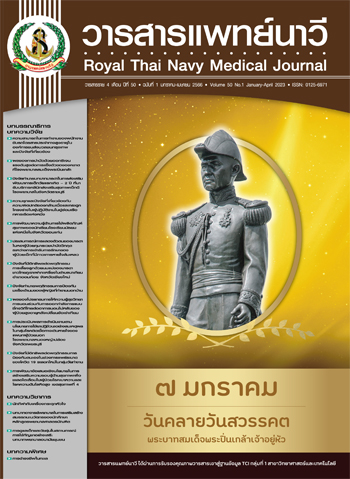Factors Influencing Breastfeeding Behaviors of Thai Karen Hill Tribe Mothers in Nagian Sub-district, Omkoi District, Chiang Mai Province
Main Article Content
Abstract
This retrospective study aimed to examine breastfeeding behaviors of Thai Karen hill tribe mothers and factors that influenced the breastfeeding practice of 157 Thai Karen hill tribe mothers in Nagian sub-district, Omkoi district, Chiang Mai province. Data were collected using questionnaires comprising 5 parts, namely, personal information, survey of knowledge about breastfeeding, survey of breastfeeding attitudes, survey of social support, and survey of breastfeeding behaviors of Thai Karen hill tribe mothers. The questionnaire was validated in terms of content and the index of Item-Objective Congruence (IOC) was 1. For the reliability, Cronbach’s coefficient alphas of the breastfeeding attitude survey, the social support survey, and the breastfeeding behavior survey were 0.92, 0.89, and 0.90, respectively. Lastly, the survey of knowledge about breastfeeding was analyzed using Kuder-Richardson Formula 20 (KR-20) and its reliability was 0.94. The data were analyzed using descriptive statistics, comprising frequency, percentage, mean, and standard deviation; and through multiple linear regression analysis.
The results showed that the practice of breastfeeding among Thai Karen hill tribe mothers was at a moderate level (Mean = 1.99). 48.41% of these Karen hill tribe mothers were found to have poor knowledge about breastfeeding, while 45.86 % had fair knowledge. The findings also showed that the overall attitude towards breastfeeding was at a moderate level (Mean = 3.63), the same level as the overall social support’s (Mean = 3.66). It was found that the 5 statistically significant factors with p < .05 that affected the breastfeeding practice of Thai Karen hill tribe mothers were: types of childbirth delivery, problems and obstacles during breastfeeding period, culture of breastfeeding, knowledge about breastfeeding, and social support. These could explain the percentage variance of 56 (R2 = 0.56, F = 37.87). in breastfeeding practice among Thai Karen hill tribe mothers.
Article Details

This work is licensed under a Creative Commons Attribution-NonCommercial-NoDerivatives 4.0 International License.
References
Charoensirivilai C. Early initiate promotion of breastfeeding in immediate postnatalcare by coaching technique. Royal Thai Navy Medical Journal 2021;48(3):729-41. (in Thai).
World Health Organization. Exclusive breastfeeding in 2011. [Internet]. [cited 2021 January 16]. Available from: http://www.who.int/nutrition/topics/exclusive_breastfeeding/en/
Puapornpong P, Aimjirasakul K, Chomtho S, Dumrongwongsiri O. Breastfeeding medical practitioners. Nonthaburi: Beyond Enterprise; 2016. (in Thai).
National Statistical Office and UNICEF. Survey of mother and child in Thailand. Bangkok: National Statistical Office Printing House; 2019. (in Thai).
Mekkamol K. Breastfeeding promotion: community practice guideline. The Southern College Network Journal of Nursing and Public Health 2018;5(3):274-86. (in Thai).
Winichagoon P, Dumrongwongsiri O. Breastfeeding situation facilitators and obstacles policy and program to promote breastfeeding in Thailand. Journal of Nutrition 2020;55(1):67-81. (in Thai).
Highland Health Development Center, Department of Health, Ministry of Public Health. Highland Health Development Center dashboard in 2020. [Internet]. [cited 2021 March 10]. Available from: https://hhdclampang.anamai.moph.go.th:8080/hhdcdashboard/. (in Thai).
Highland Health Development Center, Department of Health, Ministry of Public Health. Health servey of Hilltribe in the Royal Development Project for border security area. Lampang: Highland Health Development Center Printing House; 2014. (in Thai).
Taraka P, Chaisawan K, Yaemsuda T. The effects of perceived self-efficacy promoting program on health promoting behavior of primigravida adolescents. Royal Thai Navy Medical Journal 2019;46(2):319-35. (in Thai).
Chainok L. Factors influencing breast feeding behaviors of postpartum adolescent mothers in Maharat Nakhonratchasima hospital. Research Report. Institute of Nursing, Suranaree University of Technology; 2015. (in Thai).
Sanitlou N, Sartphet W, Naphaarrak Y. Sample size calculation using G*Power program. Journal of Suvarnabhumi Institute of Technology 2019;5(1):496-507. (in Thai).
Cohen J. Statistical power analysis for the behavioral sciences. 2nd ed. New York: Routledge; 1988.
Srisatidnarakul B. The methodology of nursing research. 2nd ed. Bangkok: Chulalongkorn University Printing House; 2002. (in Thai).
Chaweewan N, Chatraporn S, Limsuwan T. Breast feeding behavior and other factor in Nakornratchaseema. Ramkhamhaeng Research Journal 2013;13(2):1-9. (in Thai).
Wichitsukhon K, Seangperm P, Watayu N, Ruangjirattean S, Payakruang S. Breastfeeding. 5th ed. Bangkok: Preone; 2014. (in Thai).
Pasuwan D. Success of exclusive breastfeeding for at least the first 6 months: a case study of Nakhon Pathom province. Kuakarun Journal of Nursing 2020;27(1):71-84. (in Thai).
Angsirisak N, Jirakanjana T, Arunyaphark P, Parai W. Knowledge attitude concept and factor about breastfeeding in Sripradu teenagers. In: Conference 2017 Association of Private Higher Education Institutions of Thailand; May 25, 2017. Rattana Bundit University, Bangkok. Bangkok: Siam U-ebook; 2017. p. 905-15. (in Thai).


